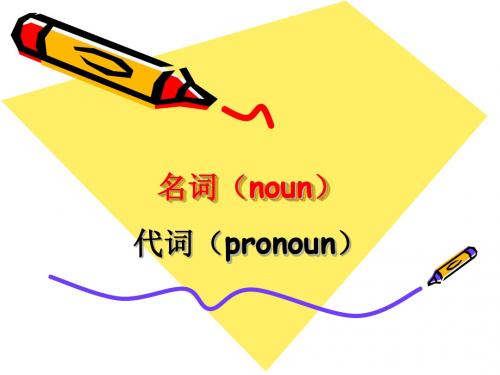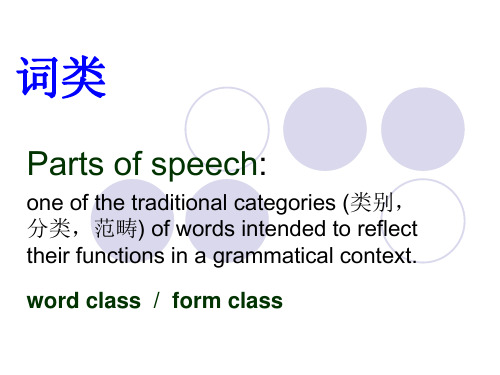noun 名词详解
词性的概念

各词性的概念名词(Nouns)是词性的一种,也是实词的一种,是指待人、物、事、时、地、情感、概念等实体或抽象事物的词。
名词可以独立成句。
在短语或句子中通常可以用代词来替代。
名词可以分为专有名词(Proper Nouns)和普通名词(Common Nouns)。
1. 专有名词:指表示人、地方、机构、组织等的专有名称。
具体说来,它包括人名、地名、月份、星期、节日、书名、电影名以及某些抽象名词等。
如:Jim吉姆China中国Mr. Smith 史密斯先生July七月Friday 星期五the Yellow River 黄河Christmas 圣诞节English 英语2.普通名词:指表示一类人或东西或抽象概念的名词。
具体地说,它可分为个体名词、集合名词、物质名词和抽象名词。
1)个体名词(Individual Nouns):表示某类人或东西中的个体,如:girl(女孩) 2)集体名词(Coll ective Nouns):表示若干个个体组成的集合体,如:family (家庭)3)物质名词(Material Nouns):表示无法分为个体的实物,如:water(水)。
4)抽象名词(Abstract Nouns):表示动作、状态、品质、感情等抽象概念,如:work(工作)。
个体名词和集体名词可以用数目来计算,称为可数名词(Countabl e Nouns),物质名词和抽象名词一般无法用数目计算,称为不可数名词(Uncountabl e Nouns)。
名词的格的问题1. 名词格的种类:英语名词有三个格,即主格、宾格和所有格。
名词的主格和宾格形式相同,所以它们又统称作通格。
当名词用作主语、宾语、表语时,用通格。
英语名词的所有格表示所属关系,它分-’s 所有格和of 所有格两种形式。
2. –’s所有格的构成方法:单数名词或不带复数词尾-s的复数名词尾均加词加-s 构成所有格,但若复数名词已带有词尾-s,则只加省字撇(’)构成所有格。
细讲英语名词Noun

3. 辅音字母+y,变y为i,加 - es。 如:university → universities 注:y前为元音字母,直接加-s。如:boy → boys 4. 以o结尾加 - es。(常见四个):
hero → heroes(英雄) Negro → Negroes(黑奴) potato → potatoes(土豆) tomato → tomatoes(西红柿)
•
My uncle has 1000 men under him. -- He is really somebody. What does he do? -- A maintenance man in a cemetery. 幻灯片 20
巧记以f\fe结尾的可数名词复数 妻子骑牛拿起刀,wife,calf,knife ↑ 追得贼狼满街跑,thief,wolf →→→变f或fe为v,再加es 碰倒架子丧己命,shelf,self,life ↓ 手帕树叶半空飘。 handkerchief,leaf,half
不可数名词的量
物质名词、抽象名词均属不可数名词。前面不能加不定冠词 a/an,词尾也不能加 - s。 请牢记下列典型的不可数名词。 news 消息; information 信息; advice 忠告,建议; progress 进步,发展; knoeledge 知识; weather 天气; fun 乐趣; equipment 设备; English 英语; furniture 家 具; wealth 财富; damage 损坏; traffic 交通,车辆及行人; baggage/luggage 行李;clothing 衣服,衣着 word 消息,信 息; work 工作; homework 家庭作业; housework 家务。
名词1

专有名词: Feng, Yan’an, English Salon Lei 个体名词: house,horse ,apple,photo,docto 集体名词: team, army, crowd, group 物质名词: water, salt , coal, air 抽象名词: friendship, progress,honesty ,he
判断下列名词的种类
water, team, friendship, house, progress, horse, doctor, army, Lei Feng, apple, salt, crowd, photo coal, air, honesty, health, group Yan’an, English Salon
His family isn’t large. His family are all music lovers.
注意:集体名词为 people, police, 谓语动 词用复数形式 e.g. The police are searching for the thief.
The team ____ has good players. (have) some The team ____ handsome. (be)
注意:专有名词的第一个字 母要大写
mon Nouns(普 通名词)
指某类人或事物的名称或者 指某种抽象概念。
1) Individual Nouns( 个体名词)
表示单个的人和事物
student; dog ; book year; dream
2)Collective nouns
(集体名词)
Two strong black coffees, please. ( 两份)
名词语法讲解

英语名词(Noun)一了解名词的分类总的来说,名词可以分为专有名词和普通名词。
一)专有名词是某个或某些人,地方,机构等专有的名称,注意这类词的中心词的第一个字母要大写。
如:China, Chinese, Jim, Li hua, New York, Shanghai,the Great Wall,To Kill a Mockingbird《杀死一只知更鸟》等。
二)普通名词是一类人或东西或是一个抽象概念的名词,普通名词可分为下面四类:1 个体名词:表示某类人或东西中的个体,如:pen, student, desk, book, bike。
2 集体名词:表示若干个个体组成的集合体,如:family, class, people3 物质名词:表示无法分为个体的实物,如:air, water。
4 抽象名词:表示状态、品质、感情等抽象概念,如:work, time, news。
二名词的数物质名词和抽象名词一般无法用数目计算,称为不可数名词(Uncountable Nouns)一般没有复数形式,只有单数形式。
个体名词和集体名词一般可以用数目来计算,称为可数名词(Countable Nouns),因此它有复数形式。
常见的不可数名词:Information 信息;news 新闻;housework 家务;homework 家庭作业;juice 果汁;Tea 茶;waste 垃圾;废料;bread 面包;milk 牛奶;orange 橙汁;money 金钱;meat 肉;advice 建议;traffic 交通;peace 和平;anger 愤怒;courage 勇气;energy 能量;fear 恐惧;fun 乐趣;health 健康;weather 天气;happiness 幸福;help 帮助;honesty 诚实;justice 正义;knowledge 知识;laughter 笑声;liberty 自由;strength 力量;trouble 麻烦;truth 真理;air 空气;progress 进步;luggage 行李;science 科学;technology 技术;smoke 烟;equipment 设备;wealth 财富;富裕music 音乐;luck 运气;furniture 家具;attention 注意某些名词既可以作不可数名词,也可以作可数名词。
名词(nouns)与代词(pronoun)1

名词的用法
•
•
•
•
•
可数名词除非前面有冠词或表示 单数的限定词,否则要用其复数 形式,例如: If a person disobeys the order,he will be punished severely. The teacher firstly divided his students into four groups. The reference book can be used to answer questions,to solve problems or to obtain information on a particular topic. These courses are especially designed for senior students.
连接代词
• 8)连接代词有:what,who,whom,whose, which,用来连接主语从句、宾语从句和表浯 从句。Whoever,whomever,whichever, whatever为复合代词。例如: • I didn't know what to do at that very moment. • The government sell public houses to whoever provides enough amount Of money. • Whomever I worry about is none of your business. • Take whichever you like,please.
名词(noun) 代词(pronoun)
专有名词
•
• • • •
1、专有名词是个别的人、地、物、团体、机构等 的专用名称。 专有名词中实词的第一个字母要大写。 如:Beijing, Tom, the People’s Republic of China(中华人民共和国) 有些专有名词使用定冠词the。如:the Great Wall(长城) 姓氏名如果采用复数形式,则表示该姓氏一家人(复 数含义),如:the Greens( 格林一家人)。
noun 名词详解

句法功能 主语、宾语、补 语、同位语等 谓语 定语、表语 状语 主语、宾语、补 语等
数词
冠词 结 构 词 介词 连词
num.
art. prep. conj.
表示数量或顺序
表示名词的泛指或特指 表示名词或代词与其他词的联 系 连接词、短语、句子
主、宾、表、定、 状语
构成名词词组 构成介词词组
感叹词
interj. 表示说话时的感情
2)有时候名词作定语要加 –ed 或与名词、形容词、数词组成复合词。 表示人或事物的特征、状态。 Among the blind people, the one-eyed man is the king. Many old people dislike the fast-paced modern life. 3) 名词常和数词一起组成作定语的复合结构。有以下三种形式: a) b) c) a three-week holiday a three weeks’ holiday a holiday of three weeks
4)部分来自拉丁、希腊语的名词的复数特殊变化 a. sis -- ses analysis –analyses crisis—crises basis -- bases thesis—theses hypothesis—hypotheses
b. um—a datum medium stratum(层次) bacterium (细菌) c. on--a criterion phenomenon
2) 以f或 fe 结尾的名词变复数时:
a. 多数是去f,fe 加ves,如: half wolf wife knife leaf
b. 但有些单词只加s,如: roof gulf cliff proof chief
名词的英文

名词的英文名词的英文是Noun。
Noun简称为:n.,是词类的一种,属于实词。
它表示人、事、物、地点或抽象概念的统一名称,可以分为专有名词和普通名词。
一、Noun 读音英式读音:[naʊn]美式读音:[naʊn]复数形式:nouns二、Noun 词性释义及词组短语(n.):名词;noun phrase :名词短语;abstract noun :抽象名词;proper noun :专有名词;uncountable noun :不可数名词;plural noun :复数名词;collective noun n. :集合名词;三、Noun 双语例句例句 1. It is a rule of English that adjectives generally precede the noun they modify.形容词一般放在所修饰名词的前面是英语中的一条规律。
例句 2. In English a noun may be preceded by a monosyllable called an article.英语的名词可以冠以一个叫做“冠词”的单音词。
例句 3. Cognition Research for the Measure Word of Noun in the Modern Chinese现代汉语名量词的认知研究例句 4. Noun is one of the basic word classes in human languages.名词是人类语言中的基本词类之一。
例句 5. Noun and pronoun can be used as Subject or Object. 名词和介词可以被用作主语或宾语。
英语语法讲解:Nouns名词

英语语法讲解:Nouns名词Nouns名词A noun is a word that names a person, place, thing, or idea.名词是可以命名人、地点、事物或观点的单词。
Nouns can name specific people, places. These are called proper nouns .名词可以命名特定的人、地点。
这些词被称为专有名词。
Nouns can also name general people, places or things. These are called mon nouns.名词也可以命名一般的群体、地点或事物。
这些词被称为普通名词。
名词的例子:Examples of proper nouns naming specific people:命名特定人的专有名词:Mrs. Jones Kelly Grandpa JimExamples of mon nouns naming general people:命名一般群体的普通名词:teacher老师 girl女孩 grandfather祖父Examples of proper nouns naming specific places:命名特定地方的专有名词:Georgia格鲁吉亚 Ireland爱尔兰 Elm Street Elementary榆树街小学Examples of mon nouns naming general places:命名一般地方的普通名词:state国家 country国家 school学校Examples of proper nouns naming specific things:命名特定事物的专有名词:Charlotte’s Web夏洛特的 Rover罗孚 Cheerios麦圈Examples of mon nouns naming general things:命名一般事物的普通名词:book书 dog狗 cereal谷物Nouns can also refer to an idea: 名词还可以指一种观点:freedom自由 peace和平 joy愉悦。
- 1、下载文档前请自行甄别文档内容的完整性,平台不提供额外的编辑、内容补充、找答案等附加服务。
- 2、"仅部分预览"的文档,不可在线预览部分如存在完整性等问题,可反馈申请退款(可完整预览的文档不适用该条件!)。
- 3、如文档侵犯您的权益,请联系客服反馈,我们会尽快为您处理(人工客服工作时间:9:00-18:30)。
句法功能 主语、宾语、补 语、同位语等 谓语 定语、表语 状语 主语、宾语、补 语等
数词
冠词 结 构 词 介词 连词
num.
art. prep. conj.
表示数量或顺序
表示名词的泛指或特指 表示名词或代词与其他词的联 系 连接词、短语、句子
主、宾、表、定、 状语
构成名词词组 构成介词词组
感叹词
interj. 表示说话时的感情
词类
(a word to which an independent meaning can be assigned )
Parts of speech
结构词
Structural Words / Function words
(a word that is uninflected and serves a grammatical function but has little identifiable meaning )
名词:tree, 实义词
Content words / Notional Words
city, teacher
动词:be, study, see 形容词:new, good 副词:very, quickly 代词:we, some 数词 :one, first 冠词 :a, an, the 介词 :of, in, on 连词:and, or, but 感叹词 :oh, hello
1. classification of nouns 2. functions of nouns 3. plural forms of count nouns 4. non-count nouns + s 5. genitive case of nouns
1. Classification of nouns
词类
缩写
作用
句法功能
名词
动词 形容词 实 义 词
副词
代词 数词 冠词
结 构 词
介词 连词 感叹词
词类 名词 动词 实 义 词 形容词 副词 代词
缩写 n. v. adj. adv. pron.
作用 表示人或事物的名称 表示动作或状态 表示人或事物的性质和特征 说明动词、形容词、其他副词 或分句 代替名词或数词
Proper noun Mass noun Non-count noun John, London, the United Nations water, metal
Noun
Abstract noun
Common noun
honesty, happiness
furniture people, family
动物
deer fish sheep swine (猪) trout (鲑鱼) buffalo (buffalos) giraffe (giraffes) peacock (peacocks) shark (sharks) Chinese Japanese Portuguese Swiss
某些国人
某些以S结 barracks(营房) headquarters works(工厂) 尾的名词 crossroads series species means craft及其 合成词
⊕有些集体名词只能用复数形式:
police mankind people cattle e.g.: Extra police are needed. poultry
(a policeman
a person …
a cow
a hen)
②有些个体名词只有复数形式: ⊕表示成双成对的东西: trousers glasses spectacles scissors ⊕表示数量很多的东西: clothes belongings savings wages surroundings (环境) ③部分表示学科的名词虽然以s 结尾单却作单数: physics economics politics mathematics electronics statistics
aircraft spacecraft hovercraft
6)名词单复数的常见考点
①集体名词的用法:
⊕有些集体名词作为整体是单数;作为成员是复数
family class group team union government jury public audience army committee crew faculty e.g.: Almost every family in the village has a man in the army. My family are early risers.
baby---babies
读 பைடு நூலகம்z/
holiday monkey
3.2 名词复数的不规则变化
1) 以o 结尾的名词,变复数时:
a. 加es
potato cargo
tomato negro hero volcano echo
b. 某些外来词加 s c. 元音字母+ o的单词加s
kimono piano solo photo kilo dynamo (发电机)auto bamboo studio radio zoo
3. 可数名词复数
3.1 可数名词复数的规则变化
构成方法 读音 清辅音后读/s/ 浊辅音和元音后 读 /z/ 例词 map-maps bag-bags /car-cars
情况
一般情况 加 -s
以s, sh, ch, x 加 -es 等结尾
以辅音字母+y结 变y 为i再 尾 加es
读 /iz/
buses/ churches/watches/ boxes/ brushes
2)有时候名词作定语要加 –ed 或与名词、形容词、数词组成复合词。 表示人或事物的特征、状态。 Among the blind people, the one-eyed man is the king. Many old people dislike the fast-paced modern life. 3) 名词常和数词一起组成作定语的复合结构。有以下三种形式: a) b) c) a three-week holiday a three weeks’ holiday a holiday of three weeks
4)部分来自拉丁、希腊语的名词的复数特殊变化 a. sis -- ses analysis –analyses crisis—crises basis -- bases thesis—theses hypothesis—hypotheses
b. um—a datum medium stratum(层次) bacterium (细菌) c. on--a criterion phenomenon
Collective noun
Individual noun Count noun
map, box, story
2. 名词的句法功能
1.名词在句子中主要充当主语、表语、宾语、宾补、介词宾 语和同位语。
Work is struggle. We love our motherland. They elected him monitor. They have gone to a concert. You guys should keep quiet.
名词可以分为专有名词和普通名词(based on lexical meaning)。
专有名词 proper noun 是某个(些)人、地方、机构等专有的名称。如 Beijing,China。 普通名词 common noun 是一类人或东西或是一个抽象概念的名词,如:book, sadness 。
普通名词又可分为以下四类: 1)个体名词 2)集体名词 3)物质名词 4)抽象名词 :work。 individual noun :表示某类人或东西中的个体,如:gun。 collective noun:表示若干个个体组成的集合体,如:family。 mass noun :表示无法分为个体的实物,如:air。 abstract noun :表示动作、状态、品质、感情等抽象概念,如
d. +e formula alumna (女校友) antenna
e. us—i nucleus radius focus
terminus (终点)
以上红色的外来词有两种复数形式:不规则的外来复数形式多来自 于科技语言;规则的英语复数形式常见于日常英语。
5) 有些名词单、复数同形
词形变化
词类 词性变化 例词
名词
动词 形容词、副 词 代词
单、复数形式
map, maps
不定式、过去式、现在分词、 to go , went, gone, going 过去分词 原级、比较级、最高级 hard, harder, hardest
主格、宾格、所有格、绝对式 I, me, my, mine
词类
Parts of speech:
one of the traditional categories (类别, 分类,范畴) of words intended to reflect their functions in a grammatical context.
word class / form class
2.名词有时候在句子中充当状语,大多表示时间、距离、重 量、价格、温度和倍数等意义。 He watched TV last night. This box weighed 20 kilograms.
3.名词作定语
1)名词用作定语,通常表示材料、用途或内容等。 a blood type a gold watch a tea cup a war story a football match a room number a peace movement
